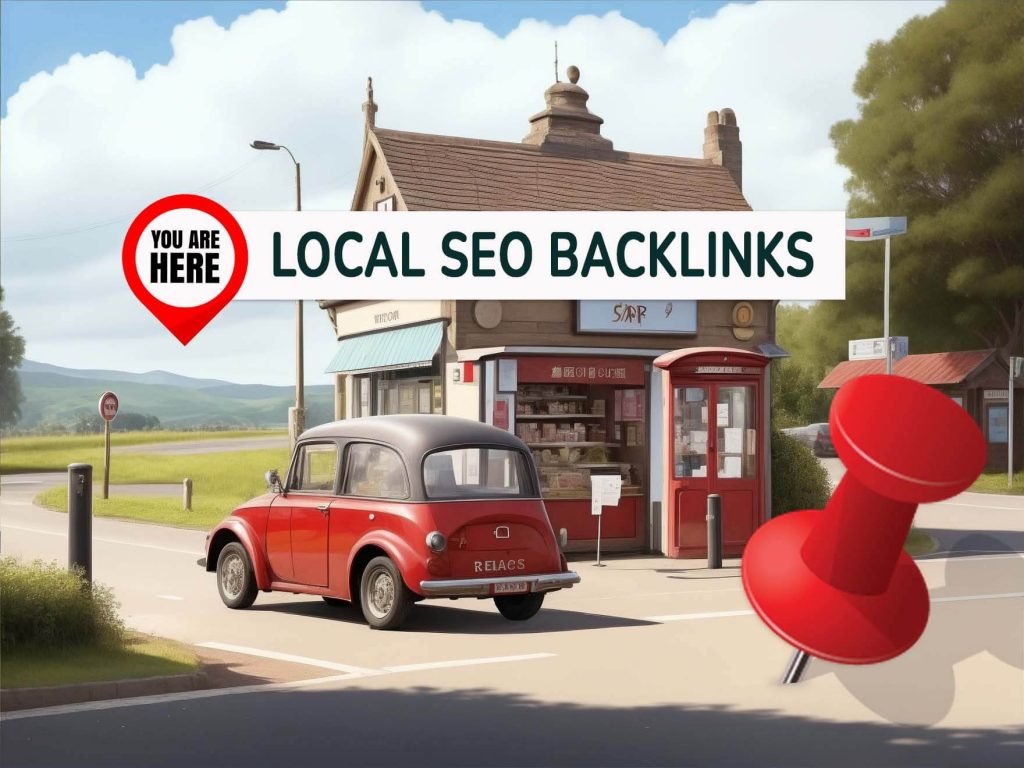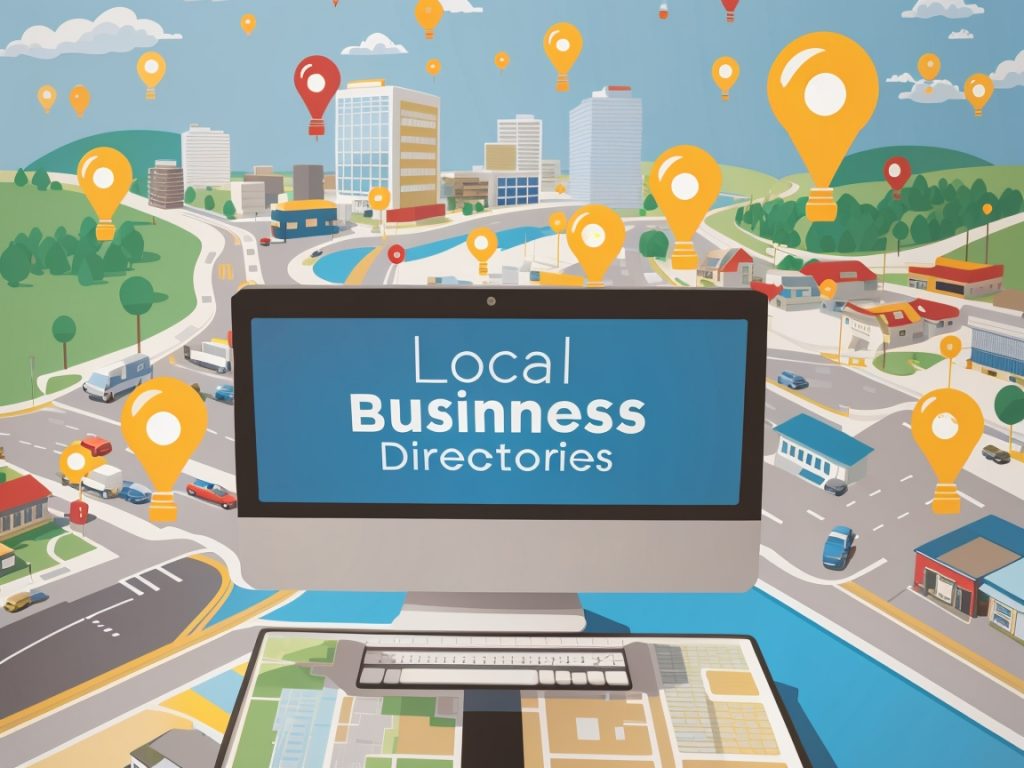
Get Noticed Locally: Make Local SEO Backlinks | Guaranteed
When we talk about “backlinks,” we mean links that point to your own website from other websites. The term “local SEO backlinks” refers to a specific type of link that originates from websites in your neighborhood, such as nearby businesses, community websites, or nonprofit organizations.

Consider these local backlinks as endorsements or approvals from other nearby websites that say, “Hey, this local business is worth checking out!” These recommendations are taken into consideration by search engines like Google. They take it as a sign that your company is significant and relevant in the neighborhood when they discover that numerous local websites are linked to your website.
It’s like receiving a seal of approval from the community, and it can actually boost your website’s chances of showing up higher in search results when people look for things related to your business in your local area.
Understanding Local Search Algorithms
When you search for something online, like a restaurant or a store near you, the search engine (like Google) uses special formulas called “algorithms” to decide which results to show you and in what order. Now, when it comes to local searches, like finding businesses close to your location, these algorithms work a little differently.
Search algorithms are complex mathematical formulas and processes used by search engines like Google to determine the most relevant and useful search results for a given query. These algorithms analyze billions of web pages, consider various factors, and rank the results based on their relevance and authority.
Here’s a more detailed explanation of how search algorithms work:

1. Crawling and Indexing: Search engines use special programs called “web crawlers” or “spiders” to explore the internet and discover web pages. These crawlers follow links from one page to another, collecting data about the content on each page. The information collected is then stored in massive databases known as indexes.

2. Understanding User Intent: When you type a search query into a search engine, the algorithm tries to understand what you’re looking for—your intent. For example, if you search for “best pizza near me,” the algorithm interprets that you want to find pizza places close to your location.
3. Relevance and Ranking Factors: Search algorithms use a wide range of factors to determine the relevance of web pages to a specific search query. Some common ranking factors include the presence of relevant keywords on the page, the quality of the content, user engagement metrics (like clicks and time spent on the page), and the website’s overall authority and trustworthiness.
4. Backlink Analysis: Backlinks play a crucial role in search algorithms. When one website links to another, it’s like a vote of confidence or a recommendation. Search engines view these local SEO backlinks as a signal of a page’s popularity, credibility, and authority. However, not all backlinks are equal. High-quality backlinks from authoritative and relevant websites carry more weight in influencing search rankings.
5. Local Search Algorithms: For local searches, like finding businesses or services nearby, search engines use specialized local search algorithms. These algorithms take into account the user’s location and look for businesses that are physically close to the searcher. Local SEO factors, including local backlinks, local citations, and Google My Business optimization, play a significant role in local search rankings. For local searches, search engines pay attention to various factors to figure out which businesses are most relevant to your location.
Keep in mind:
Machine Learning and Updates: Search algorithms are continuously evolving. Search engines use machine learning and regularly update their algorithms to improve the quality of search results and stay ahead of manipulative tactics. Major algorithm updates can have significant impacts on search rankings, and website owners need to stay informed about industry best practices to maintain and improve their rankings.
How to get local SEO backlinks
Consider your website to be a hip store in your area. You want people to talk about your store and tell their friends about it so that more people become aware of it. Online, these endorsements are referred to as “backlinks.”
Local link building is like getting those recommendations from other websites in your local area. When local websites link to your website, it’s like they are saying, “Hey, check out this awesome local shop!” These links show search engines that your website is relevant and trustworthy for people in your neighborhood. To get legit local SEO backlinks, you can try a few strategies. First, you can write interesting articles or stories about your shop and share them with local blogs or community websites. They might find your content useful and link to your website.

You can also join hands with other local businesses or organizations. For example, if you have a local bakery, you could collaborate with a nearby coffee shop. Both of you can mention each other on your websites, creating valuable backlinks.
Utilizing local directories and review platforms for backlinks: Take advantage of local directories and review platforms that allow you to list your business and include a link back to your website. Popular platforms like Yelp, Google My Business, and TripAdvisor provide opportunities to showcase your business to local customers while earning valuable backlinks.
Backlinks and Local Citations

Local citations are like mentions or listings of your business information, such as the name, address, and phone number (NAP), on various websites, directories, and platforms across the internet. These citations help search engines validate the legitimacy and existence of your local business.
When your business details are consistent and accurately listed on different online platforms, search engines gain more confidence in your business’s authenticity. This consistency sends a strong signal that your business has a reliable and established presence in your local area.
For example, imagine your business is listed on local directories, community websites, and other online platforms, all showing the same accurate NAP information. When search engines find these matching citations, they become more certain that your business is real and serves a specific local area.
Having robust local citations can positively impact your local search visibility. Search engines are more likely to present your business to people searching for products or services in your area because they see it as a trustworthy and legitimate local option.
Monitoring and Measuring the Impact of Local SEO Backlinks
Tracking and analyzing the performance of your backlinks is essential to understanding their impact on your local search visibility. Some tools and techniques to consider for monitoring backlinks include:
- Backlink analysis tools: Use tools like Moz, Ahrefs, or SEMrush to gain insights into the quantity, quality, and relevance of your backlinks. These tools provide valuable metrics, such as Domain Authority, to help you evaluate the effectiveness of your backlinking efforts.
- Analyzing local search rankings: Regularly monitor your business’s local search rankings to identify any correlation between improvements in backlinks and increased visibility. This can help you understand which local SEO backlinks methods are working best for your business.
- Adjusting backlink strategies based on analytics and insights Based on the data gathered from backlink analysis and local search rankings, make informed decisions about refining your backlinking strategies. Identify opportunities to focus on acquiring backlinks from influential local websites and modify your content creation approach to cater to your target audience’s needs.
Avoiding Common Pitfalls in backlinks

While backlinks can significantly boost your local SEO efforts, it’s important to avoid common pitfalls that can harm your online visibility:
- Overcoming the temptation of low-quality backlinks: It can be tempting to acquire numerous backlinks quickly, but focusing on quantity over quality can lead to penalties from search engines. Instead, prioritize acquiring high-quality backlinks from reputable sources.
- Steering clear of black-hat SEO practices: Avoid engaging in manipulative practices such as buying backlinks or participating in link schemes. Such practices are against search engine guidelines and can result in severe penalties.
- Considering the local relevance and authority of linking sites: Ensure that the websites from which you acquire backlinks are locally relevant and authoritative. Aim for local SEO backlinks from local businesses, organizations, and influencers that are trusted and respected within your community.
Future Trends in 2023: SEO Backlinks Roadmap
As search engine algorithms continue to evolve, the landscape of backlinks and local SEO is also likely to change. Here are some future trends to consider:

- Evolving algorithms and their impact on local backlink strategies: Search engines are constantly refining their algorithms to provide the most relevant and valuable search results for users. Stay up-to-date with these algorithm updates and adjust your backlinking strategies accordingly.
- The emergence of local link-building agencies: With the increasing focus on local SEO, specialized agencies that are experts in local link building are likely to emerge. Consider partnering with these agencies to enhance your backlinking efforts and improve your business’s local search visibility.
- Integrating backlink strategies with voice search and mobile optimization: As voice search and mobile usage continue to rise, it’s crucial to optimize your website for these platforms. This includes incorporating backlink strategies that align with voice search and mobile-friendly practices.
Local SEO Examples

Here are some examples of local SEO practices that businesses can implement to improve their visibility in local search results:
Google My Business (GMB) Optimization: Creating and optimizing a Google My Business listing is crucial for local SEO. Businesses should provide accurate and up-to-date information, such as their name, address, phone number, business hours, website URL, and relevant categories. Regularly updating GMB posts, responding to customer reviews, and adding photos can also enhance local visibility.
Local Keyword Optimization: Businesses can focus on using local keywords in their website content, meta tags, and headings to target specific geographic locations. For example, using phrases like “best coffee shop in [city]” or “top-rated plumber in [town]” can help attract local search traffic.
Local Content Creation: Creating content that is relevant to the local audience can be beneficial for local SEO. Businesses can write blog posts or articles about local events, news, or tips that resonate with the community and encourage local engagement.
Make local SEO backlinks: Building relationships with other local businesses, organizations, and community websites can lead to valuable local backlinks. Engaging in partnerships, sponsoring local events, or contributing guest posts to local blogs can help attract relevant local links.
Online Reviews and Reputation Management: Encouraging positive online reviews from satisfied customers on platforms like Google, Yelp, or Facebook can boost local credibility. Responding to reviews, both positive and negative, shows a business’s commitment to customer service.
Mobile-Friendly Website: Optimizing the website for mobile users is crucial for local SEO, as many local searches are performed on mobile devices. A responsive design ensures that the website displays correctly and functions well on different devices.
Local Schema Markup: Implementing schema markup on the website can help search engines understand the business’s location, contact information, and other relevant details. This can enhance the appearance of business information in search results.
Geotargeted Ad Campaigns: Running geotargeted advertising campaigns, such as Google Ads or Facebook Ads, can help businesses reach a specific local audience with tailored messages and promotions.
Local Social Media Engagement: Active participation on social media platforms can foster engagement with the local community. Responding to comments, sharing local events, and promoting special offers can attract local customers and improve brand visibility.
Understanding how search algorithms work and the importance of backlinks allows businesses to optimize their websites for local searches effectively.
In conclusion, for businesses aiming to improve their visibility in local search results, a well-rounded local SEO strategy that includes acquiring quality local backlinks and maintaining consistent local citations is essential. These practices, along with valuable local content and engagement with the local community, contribute to a strong online presence and increased trustworthiness in the eyes of both search engines and potential customers. Ultimately, by focusing on these aspects, businesses can successfully establish themselves as authoritative players in their local area, attract more local customers, and achieve their growth objectives.


